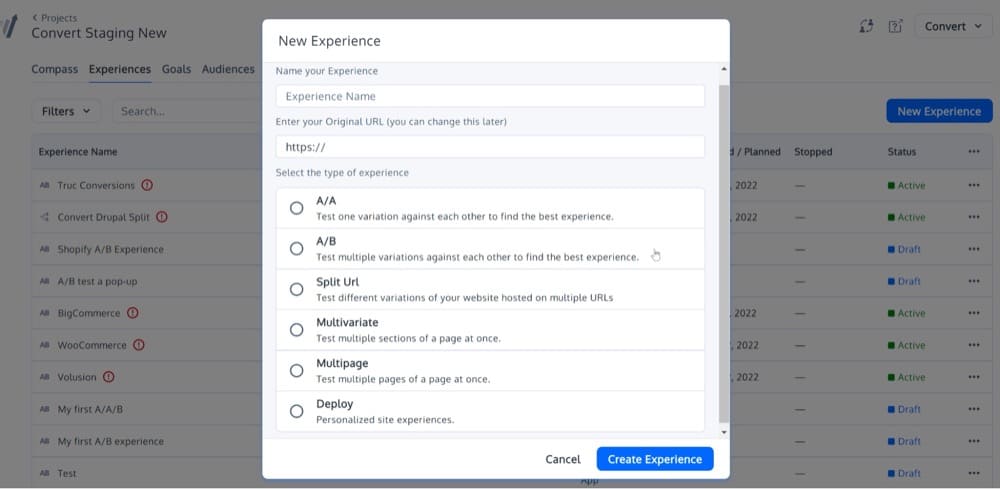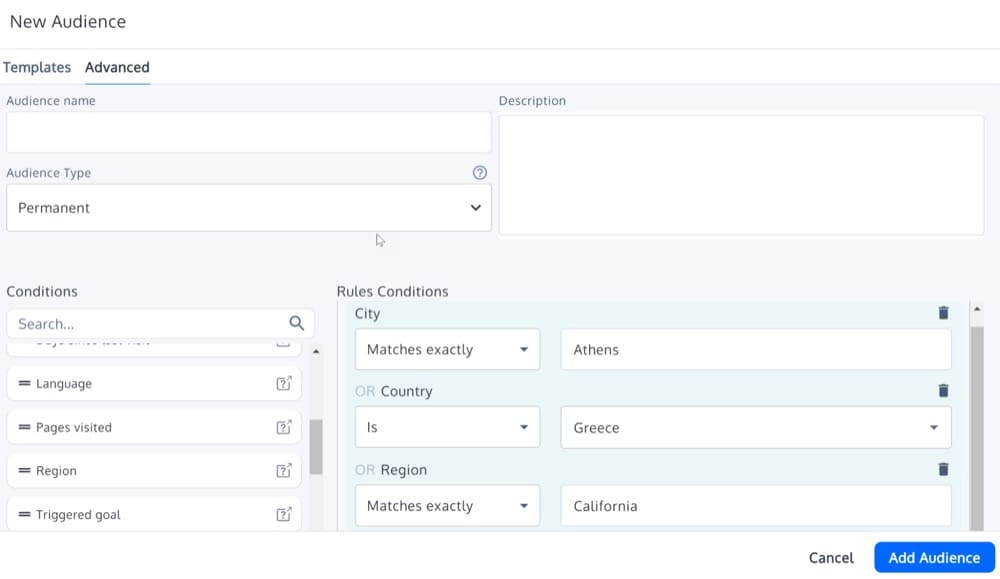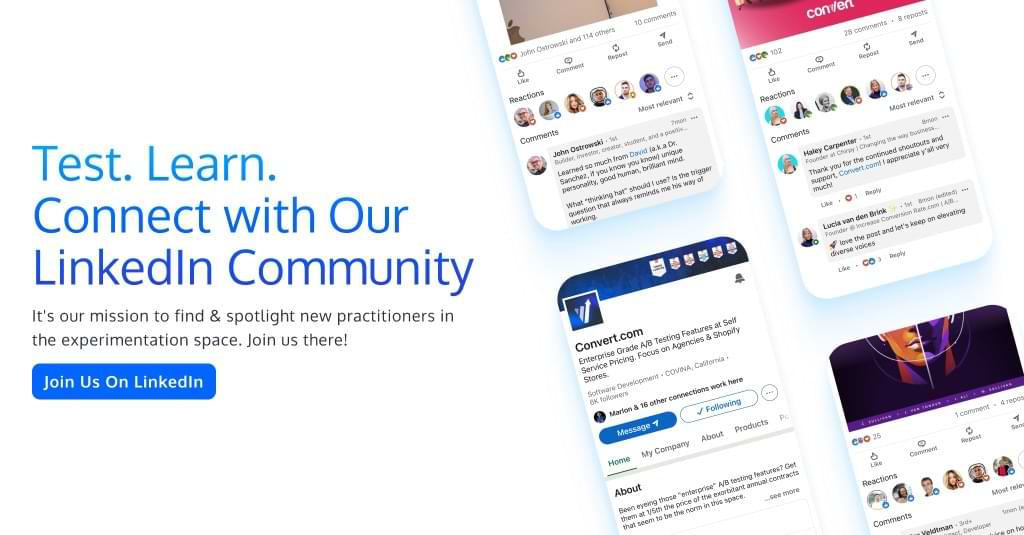Behind the Scenes of Picking an A/B Testing Tool (+ Why Convert Makes Sense for Our Agency)
Editor’s Note: We’ve got something special for you today—an exclusive firsthand account from WeTeachCRO taking us through their journey of selecting the perfect tool partner for their agency. It’s worth mentioning that they happen to be using our tool, but don’t worry—this is not a shameless plug. Matt, our featured insider, is here to provide genuine insights and practical advice.
The tools we use as an agency matter. They form part of our client-facing experience & therefore our reputation. And all agencies trade on the value of their reputation.
So it’s clear why the tool choices we make are important.
But for my agency WeTeachCRO at least, that choice isn’t just about features or cost; it’s much wider than that.
Our tool choice has to be part of our wider strategy, our bigger picture, and our public image too. When we made the decision to partner with Convert, we were taking all of that into account.
So if you find yourself looking to select a tool partner for your agency, you might just benefit from the next few minutes of reading 🙂
#1. The Tool Is Only as Good as the People Using It
This is a common refrain across the CRO world, and rightly so because it is the truth!
Doesn’t matter how capable a tool is, it will never make up for an under-investment in people.
That is a phrase that I have used multiple times myself over the years, and it is a cornerstone of our beliefs as an agency on the best way to invest budgets; prioritising people over tools.
And so for us, it was important that our overall proposition reflected that narrative — if we were asked for a tool recommendation, then it had to be congruent with the wider narrative.
Convert gives us just that; a tool that is capable of everything we need from it (in the right hands), and at a cost level that reinforces our narrative of people-first budgeting.
#2. ROI Is the Lifeblood of Any CRO Investment
Another common refrain of our industry, and again one that is undeniably true.
For all the value that our experiments add to the organisations we work with, they will still be looking at the money-in, money-out calculations to determine whether the investment has been a positive one or not.
And so what matters to us as CRO service providers is efficiency; maximising the value of our programmes is meaningless if we aren’t balancing that appropriately with our costs to our clients.
And when you weave that efficiency strand into the wider narrative, it becomes even more obvious.
When it comes to tools, 99.99% of end-clients do not need more features from their tools; they need to make better use of the features that they already have. Or in many cases, reduce their spend on tools with features that they never use, and shift it into people that can actually improve their feature-use percentage!
A few examples to illustrate these points from my personal experience:
- An enterprise-level food & beverage business starting out on CRO for the first time were keen to explore tools that could integrate with a DMP. But on further questioning, it turned out that they didn’t yet have a DMP in place – it was a desire, but not a reality. Almost 5 years later, that is still the case!
- Another enterprise-level SaaS business was looking to run a pilot for simple geo-location personalisation for banners & asked in passing about tools that could do that for them. Well as existing Convert users, we told them they needn’t look any further…
- One of the UK’s major insurers was spending upwards of £10k / month on a tool because it was the one that their agency specialised in. And once we had a look at what they were executing through that tool, they could’ve achieved the same things with Convert at <10% of the cost.
Now I don’t think that the Convert team will be angry with me for saying that there are other tools on the market that are more feature-rich. And if they are, this section will never make it to print!
But what Convert provides to us as an agency is the means to provide our clients with a set of features that they will actually make use of. And not to provide a tool that has so many bells & whistles that they are clearly paying for functionality they don’t need.
So that ticks our efficiency box 🙂
#3. Autonomy of Decision-Making
Our agencies are our fiefdoms. They are places where we have the freedom to make the decisions that we believe are the right ones.
And as such, we shouldn’t be sacrificing those decision-making powers for any partner, tech or otherwise, that we go into business with.
Convert allows that for us.
We buy our package from them once a year & we have the capability to use it as we see fit. And anyone who has shopped around our industry probably knows that that isn’t always the case!
For example:
- We aren’t forced into any kind of exclusivity deal — meaning that if we believe a particular client would be better served to use a tool other than Convert, we are free to make that recommendation. And for me, maintaining that autonomy is vitally important. We should not sully ourselves by making a knowingly-false recommendation just because a contract says we have to!
- We don’t have to chunk up our allocation into fixed packages. If we want to provide up to 1m tested users / year to a client, we can. Or 500k. Or 10k / month. Or frankly, any other amount / time-period combination that we see fit. And having spoken with other vendors recently, I know for a fact that this is not always the case! So again, we would have to sacrifice our honest opinion for something that had to be wedged into a partner’s way of working. Not for us 😉
- We don’t have to upgrade or change the package if we don’t want to. Convert’s policy of allowing us to renew our existing package, even if it is no longer offered to net-new customers, is a major benefit to us. We’ve been customers for many years now, and the package we currently have works for us. And by enabling us to stay in control of our renewal terms, Convert allows us to retain that decision-making power.
So this autonomy that we retain is what sets Convert apart for us; they are a true partner because they do not dictate to us how to run our business 🙂
#4. Sales Enablement
To sell in the CRO world, you need both tool(s) & service. And prior to partnering with Convert in 2017, sometimes the former would trip us up.
We’d get quite a way down the sales process only to find that the tool side of the story hadn’t been resolved, and therefore no deal could be struck. The ball was back in the prospect’s court, and their lack of experience in the industry meant that the decision could drag on.
Now sure, part of this was probably down to my sales naivety(!), but it was also a strategic issue — we had no means of offering a good tool to our prospects & therefore keeping the conversation moving. And even if we did make recommendations, we had no control over the timings or costs, which constantly put us on the back foot.
But once we partnered with Convert, that side of the sales discussion became much easier.
- We could maintain our “tool-agnostic” position because of a non-exclusivity element to our partnership — so if a prospect already had a tool in place they were happy with, we didn’t need to force a switch for no reason.
- We could make a recommendation of Convert where it fitted their needs, knowing we had control over the cost & time to provision.
- We could also provide a full budget breakdown across both tool & service elements — which is an essential when most CRO budgets are required to cover both!
- We could move our sales discussions along more smoothly without having the enforced breaks caused by tool discussions they needed to have elsewhere.
So the way that Convert go about their business was a big boost to how we could go about ours; again, as a true partnership should be 🙂
Closing Thoughts
Convert didn’t put me up to this topic; I chose it myself.
And I chose it because as an agency owner, there is far more to tool choices than features & cost — your choices should be part of your wider strategy & the image you want to project for your business.
Some of the specifics I have written about might not be relevant to you or your agency, but the wider message should be: before you hitch your agency to a partner, think about the bigger picture.
Written By
Matt Scaysbrook

Edited By
Carmen Apostu




